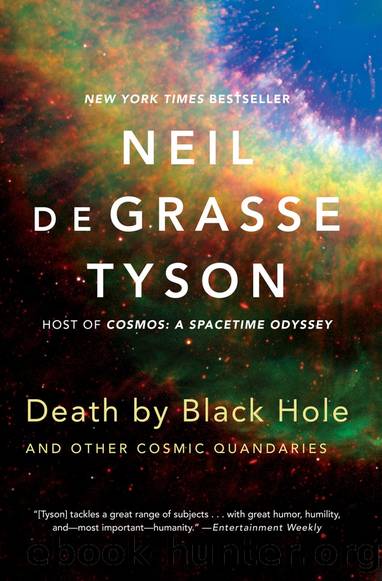Death by Black Hole, and Other Cosmic Quandaries by Neil DeGrasse Tyson

Author:Neil DeGrasse Tyson [Tyson, Neil DeGrasse]
Language: eng
Format: epub
ISBN: 9780393062243
Google: 0co_UQgNXacC
Amazon: 039335038X
Barnesnoble: 039335038X
Goodreads: 20663770
Publisher: W. W. Norton & Company
Published: 2007-01-15T06:00:00+00:00
ALTHOUGH ICE IN the cold and dark of your freezer evaporates over time (just look at cubes in your freezerâs ice tray after youâve come back from a long vacation), the bottoms of these craters are so cold that evaporation has effectively stopped for all needs of this discussion. No doubt about it, if we were ever to establish an outpost on the Moon it would benefit greatly from being located near such craters. Apart from the obvious advantages of having ice to melt, filter, then drink, you can also break apart the waterâs hydrogen from its oxygen. Use the hydrogen and some of the oxygen as active ingredients in rocket fuel and keep the rest of the oxygen for breathing. And in your spare time between space missions, you can always go ice skating on the frozen lake created with the extracted water.
Knowing that the Moon has been hit by impactors, as its pristine record of craters tells us, then one might expect Earth to have been hit too. Given Earthâs larger size and stronger gravity, one might even expect us to have been hit many more times. It has beenâfrom birth all the way to present day. In the beginning, Earth didnât just hatch from an interstellar void as a preformed spherical blob. It grew from the condensing protosolar gas cloud from which the other planets and the Sun were formed. Earth continued to grow by accreting small solid particles and eventually through incessant impacts with mineral-rich asteroids and water-rich comets. How incessant? The early impact rate of comets is suspected of being high enough to have delivered Earthâs entire oceanic supply of water. But uncertainties (and controversies) remain. When compared with the water in Earthâs oceans, the water in comets observed today is anomalously high in deuterium, a form of hydrogen that packs one extra neutron in its nucleus. If the oceans were delivered by comets, then the comets available to hit Earth during the early solar system must have had a somewhat different chemical profile.
And just when you thought it was safe to go outside, a recent study on the water level in Earthâs upper atmosphere suggests that Earth regularly gets slammed by house-sized chunks of ice. These interplanetary snowballs swiftly vaporize on impact with the air, but they too contribute to Earthâs water budget. If the observed rate has been constant over the 4.6 billion-year history of Earth, then these snowballs may also account for the worldâs oceans. When added to the water vapor that we know is out-gassed from volcanic eruptions, we have no shortage of ways that Earth could have acquired its supply of surface water.
Our mighty oceans now comprise over two-thirds of Earthâs surface area, but only about one five-thousandth of Earthâs total mass. While a small fraction of the total, the oceans weigh in at a hefty 1.5 quintillion tons, 2 percent of which is frozen at any given time. If Earth ever suffers a runaway greenhouse effect (like what has
Download
This site does not store any files on its server. We only index and link to content provided by other sites. Please contact the content providers to delete copyright contents if any and email us, we'll remove relevant links or contents immediately.
| Aeronautics & Astronautics | Astronomy |
| Astrophysics & Space Science | Comets, Meteors & Asteroids |
| Cosmology | Mars |
| Solar System | Star-Gazing |
| Telescopes | UFOs |
Tools of Titans by Timothy Ferriss(8354)
Turbulence by E. J. Noyes(8012)
Secrets of Antigravity Propulsion: Tesla, UFOs, and Classified Aerospace Technology by Ph.D. Paul A. Laviolette(5361)
Astrophysics for People in a Hurry by Neil DeGrasse Tyson(5172)
Room 212 by Kate Stewart(5095)
Design of Trajectory Optimization Approach for Space Maneuver Vehicle Skip Entry Problems by Runqi Chai & Al Savvaris & Antonios Tsourdos & Senchun Chai(5058)
Pale Blue Dot by Carl Sagan(4988)
The David Icke Guide to the Global Conspiracy (and how to end it) by David Icke(4690)
A Journey Through Divination and Astronomy by Publishing Pottermore(4372)
Goodbye Paradise(3793)
Apollo 8 by Jeffrey Kluger(3696)
COSMOS by Carl Sagan(3612)
The Five People You Meet in Heaven by Mitch Albom(3548)
Losing the Nobel Prize by Brian Keating(3530)
How to Read Water: Clues and Patterns from Puddles to the Sea (Natural Navigation) by Tristan Gooley(3453)
Brief Answers to the Big Questions by Stephen Hawking(3415)
How to Read Nature by Tristan Gooley(3318)
The Order of Time by Carlo Rovelli(3177)
A Brief History of Time by Stephen Hawking(3013)
